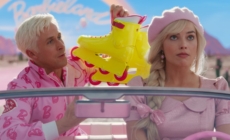-
Fireworks warehouse explosion: Authorities search home of CEO - 15 mins ago
-
Israel Launches New Ground Incursion in Lebanon, Raising Fears for Truce - 21 mins ago
-
Vikings Linked to Major Roster Move Ahead of Training Camp - 41 mins ago
-
Body scanners? Drug-sniffing dogs? Virtual mail? L.A. County wants contraband crackdown inside juvenile hall - 56 mins ago
-
A Dark-of-Night Flood Escape at the River Inn in Texas - about 1 hour ago
-
What’s leaving Netflix in July 2025? Full List of Movies, Shows - about 1 hour ago
-
‘Go away!’ SoCal hiker captures scary encounter with mountain lion on video - 2 hours ago
-
Elon Musk Consulted Curtis Yarvin, Right-Wing Thinker, on Third Party - 2 hours ago
-
PGA Tour Posts Persimmon Gift for Rory McIlroy amid Grand Slam - 2 hours ago
-
L.A. must remove 9,800 encampments. But are homeless people getting housed? - 2 hours ago
Putin’s Problems in Europe Are Getting Worse
Serbia’s populist prime minister, Milos Vucevic, has resigned after protests dealing the latest challenge to Vladimir Putin’s political support in Europe.
Vucevic stepped down following weeks of demonstrations generated by the deadly collapse of a concrete canopy, which reflected discontent at the increasingly autocratic rule of President Aleksandar Vučić.
While Serbia has condemned Putin’s war in Ukraine, Vučić has refused to join in the sanctions against Russia. This comes as Hungary’s prime minister, Viktor Orbán—Putin’s closest EU ally—faces a challenge from Hungarian opposition leader Péter Magyar. Also, the government of Slovakian Prime Minister Robert Fico—who met Putin in Moscow last month—faces protests over pro-Russian policies.
Meanwhile, adding to the complications for a key revenue generator for Putin’s war in Ukraine, Poland’s president said Russian gas flows to Europe should never resume.
Newsweek has contacted the Russian Foreign Ministry by email for comment.

Getty Images
Why It Matters
Putin’s full-scale invasion of Ukraine almost three years ago has left him isolated in Europe, but the leaders of Hungary, Slovakia and non-EU member Serbia were among those who have resisted sanctions.
Political turbulence in those countries and no prospect of Russian gas entering the Continent could add to the Russian president’s long-term problems.
What To Know
There is turmoil in Serbia’s government after Vucevic resigned following protests against bad governance following a canopy collapse in November that killed 15 people in the northern city of Novi Sad.
Vucevic’s resignation could lead to an early parliamentary election and Serbia’s parliament has 30 days to choose a new government or call a snap election.
Vučić met with Putin this past October, after which he said Serbia would not bow to Western pressure and impose sanctions for the invasion of Ukraine. Belgrade has condemned Moscow’s aggression but says sanctions are not in its national interest.
This comes as Polish President Andrzej Duda told the BBC the Nord Stream gas pipelines between Russia and Germany should never be restored. Nord Stream 1 was shut down in 2022, and Nord Stream 2 was not used. Both were damaged by explosions.
Germany’s far-right Alternative for Germany party, which launched its federal election campaign last week, said the pipes could resume operations, but Duda said that they must be dismantled because they are an economic threat to Ukraine, Poland, Slovakia and Central Europe.
Hungary’s Orbán wants to keep Russian gas flowing to Europe farther south and has condemned the nonrenewal of Ukraine’s gas transit agreement with Moscow, which expired at the start of the new year.
Orbán’s anger at the gas deal ending prompted him to refuse to reauthorize an EU sanctions package against Moscow that requires unanimity, although he later backed down, dealing a blow to Putin.
With Hungarian elections set for next year, it is not certain if Putin’s closest ally in the EU will remain in power. Magyar, who leads the opposition Respect and Freedom (Tisza) Party, has been described as “an unprecedented threat to Viktor Orbán’s rule” by the European Consortium for Political Research.
In neighboring Slovakia, thousands have taken to the streets protesting the tilt toward Moscow by the government of Putin’s other EU ally, Fico, the leader of the Smer party. He has ended Slovakia’s military support for Ukraine and opposed sanctions against Moscow.
What People Are Saying
Serbia’s Vucevic said: “It is my appeal for everyone to calm down the passions and return to dialogue.”
Slovakia’s Fico said: “The government can only be changed through elections.”
Poland’s Duda said: “I can only hope that European leaders will learn lessons from Russia’s aggression against Ukraine and that they will push through a decision to never restore the pumping of gas through [Nord Stream].”
What Happens Next
Whether European leaders seen as sympathetic to Putin will remain in office for the long term is not clear.
Protesters in Slovakia have called for the resignation of Fico, who said the government can be changed only through elections. He said on Monday that could be a possibility given that four MPs have withdrawn from the governing coalition, leaving the government without a majority.
Serbia could have an election in the coming weeks. Meanwhile, Orbán faces a tough challenge in Hungary’s elections next year.
Source link


















